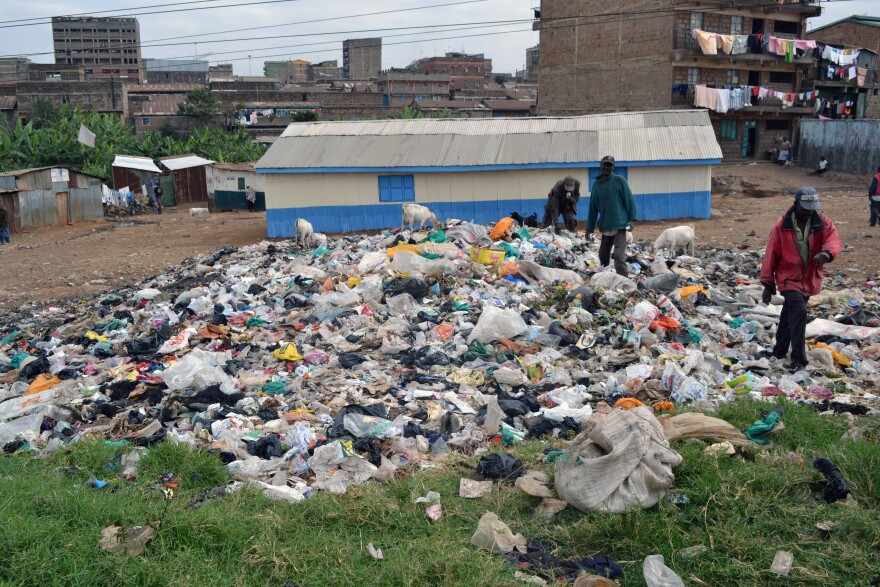The Innovation Trail's Ryan Delaney recently returned from a reporting trip to Kenya. This is the first of the stories he filed. You can find the rest of his reporting here.
Trash and sewage is a common site along rutted dirt paths in Baba Dogo, one of the informal settlements, or slums, in the capital Nairobi. It all culminates in the middle of an open field.
"Before us is a community dump site," points out Sammy Aweti. "It’s where a majority of area residents come to dump their waste and their other garbages. So as you can see, it’s very piled."
Despite the highly visible trash heap, Baba Dogo’s waste doesn’t attract much attention. With no formal collection system, Justice Muhando explains, putting out the trash often turns into a game of hide-and-go-seek."You wake up early, you pick your garbage, [and] when your neighbor is not yet awake you leave it on their doorstep," he said.
On a map
Muhando works with the group Spatial Collective. They’re trying to put the problems of Nairobi’s slums on the map. Literally.
Muhando, Aweti and other volunteers from the community group Sisi Ni Amani, or We Are Peace, are canvassing the settlement with pocket-sized GPS devices and surveys. Spatial Collective will take the data collected and put it on a map.

Armed with this hard data, they can now go to local government officials or charities and show them just where the dump sites are and the problems they’re causing.
"When you collect that information, you can link it to the health, you can link it to maybe the standard of living of people," Muhando said. "So what I think we should do is show it to the responsible authorities. They’re the one that should follow up because the person on the ground is just a resident; they can’t do much."
The group also works to shed light on other common settlement issues like areas of high crime and access to health care services or clean water.
Election protection
The idea of using mobile technology to crowdsource information dates back to Kenya’s presidential elections in late 2007. When results were disputed, violence broke out in several parts of the country and more than 1,000 people were killed.
A mobile platform called Ushahidi, the Swahili word for "witness," popped up after just a few days. Daudi Were and other Kenyan techies were soon tracking and collecting reports of violence over text messaging.
Ushahidi has since grown into a global platform. Its software was used after the natural disasters in Haiti and Japan.
And this spring, when Kenyans went to the ballot boxes again, Ushahidi was there with a new set of tools.
"In a nutshell, we’re basically turning every Kenyan with a cell phone into an election monitor," said Were.
Ushahidi used volunteers all over the country to report possible instances of voting irregularities, intimidation or a shortage of ballot papers. They put confirmed problems on a map and notified the proper authorities.
"We’re talking about election protection," said Were.
Ushahidi’s election monitoring platform tracked several thousand reports, but Were says technology is only "10 percent of the solution." Ushahidi and Spatial Collective don’t have the resources to fix problems like a shortage of ballots or dumpsters, but they’re making the problems more visible; and harder to ignore.
You can find more from Ryan's trip to East Africa on his Tumblr, Will Trade for Elephants.




